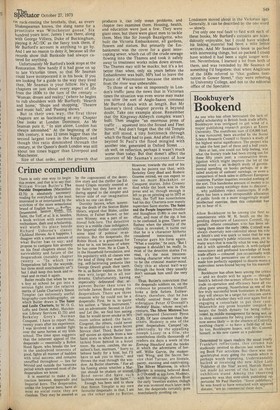Bookbuyer's
Bookend
As one who has often bemoaned the lack of useful scholarship in British book trade affairs. Bookbuyer was intrigued to get wind of a major publishing research project at Essex University. The munificent sum of £16,000 had, it was rumoured, been awarded by the Social Science Research Council to finance a study of the highest social significance. The project Was to take the best part of three and a half years.
Here at last, one could not help feeling, was what the literary trade had been crying out for these fifty years past: a constructive investigation which might improve the lot of the printed word — an in-depth study of governmental spending on books perhaps, or a detailed analysis of authors' earnings, or even a comparison of book sales in different European countries. Further inquiries revealed nothing Of the sort. This handsome amount of money is to enable two young sociology dons to discover . . . why publishers reject manuscripts. If ev& there has been a more irresponsible allocation of public funds on a more staggeringly stupid intellectual exercise, then this columnist has yet to hear alit.
Allow Bookbuyer to be among the first to commiserate with W. H. Smith on the impending departure of Laurence Cottrell, tile genially urbane consultant who has been advising them since the early 1960s. Cottrell was always cheerfully non-commital about his role at Smith's and was quick to insist that he was not the company's public relations man, yet in many ways that is exactly what he was, and he did it with splendid aplomb. A well-judged insouciance and profound knowledge of book trade affairs — coloured just occasionally with a cavalier but persuasive use of statistics — made him perfectly equipped to disarm many,a malevolent news-hound baying for his masters' blood.
Bookbuyer has often been among the critics — and no doubt will be again — though Smith's behind-the-scenes efforts to further
trade co-operation and efficiency have all too often gone unsung. Nonetheless as one of the
few truly successful book businesses in Britain, they will always be a target for criticism and it is doubtful whether they will ever again find so engaging a consultant to put their case. Meanwhile any press bounder tempted to berate the Smith dynasty for being. toffeenosed, its middle management for being wet, or its shop assistants for being plain ungracious, now seems likely — in the absence of Cottrell's soothing charm — to have a field-day of fun. So too, Bookbuyer hopes. will Mr. Cottrell himself, in his new career as a publisher.
Determined to spare readers the usual yearly Frankfurt reflections, this column has' studiously omitted to discuss last week's boring Book Fair activities. But there was one apochryphal story going the rounds which is perhaps worth repeating. Understandably bucked at receiving the new Allen Lane 'Publisher of the Year' award, Ham ish Hamilton made no secret of the fact on their exhibition stand. Among the observing passers-by was that ever-sleek publishing opportunist Mr Paul Hamlyn. "Some publishers." he was heard to have remarked with apparent distaste, "are so commercial these days."


































 Previous page
Previous page